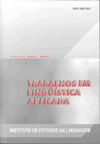Resumo
In this paper I discuss some representations of oral evaluation in the learning of English as a Foreign Language (FL) in a Brazilian undergraduate institution for FL teachers. My analysis includes questions and concepts from applied linguistics, discourse analysis and psychoanalysis. In this perspective, subjectivity is constituent of discourse; subject-teachers take contradictory positions during the assessment of their students’ learning process. These positions are characterized as gestures of interpretation because they answer demands, in this case, from scientific, technical, juridical and political/transferencial voices. The corpus was constructed with discursive practices of teachers and students at the end of a 4 year-course of study. In my analysis, I use the concept of Discursive Formations (DF), understood as enunciative regularities within a field of knowledge. I take as themes the elements of traditional oral evaluation, such as fluency and pronunciation, and representations of communicative competence/proficiency. As a result, I show that, in the process of assessment, people take stands within DFs that I have named “Including” and “Excluding”, as well as some of its modulations, “Unconditional inclusion”, and “Excluding perfection”. The “Excluding” DF is characterized by the representation of perfection which contradictorily excludes both the students’ fault and excellence. The “Inclusive” DF accepts the student’s faults and progress, turning relative their performance. In this DF a progress and a passing grade above an abstract minimum are guaranteed to all or most students.O periódico Trabalhos em Linguística Aplicada utiliza a licença do Creative Commons (CC), preservando assim, a integridade dos artigos em ambiente de acesso aberto, em que:
- A publicação se reserva o direito de efetuar, nos originais, alterações de ordem normativa, ortográfica e gramatical, com vistas a manter o padrão culto da língua, respeitando, porém, o estilo dos autores;
- Os originais não serão devolvidos aos autores;
- Os autores mantêm os direitos totais sobre seus trabalhos publicados na Trabalhos de Linguística Aplicada, ficando sua reimpressão total ou parcial, depósito ou republicação sujeita à indicação de primeira publicação na revista, por meio da licença CC-BY;
- Deve ser consignada a fonte de publicação original;
- As opiniões emitidas pelos autores dos artigos são de sua exclusiva responsabilidade.
Downloads
Não há dados estatísticos.

